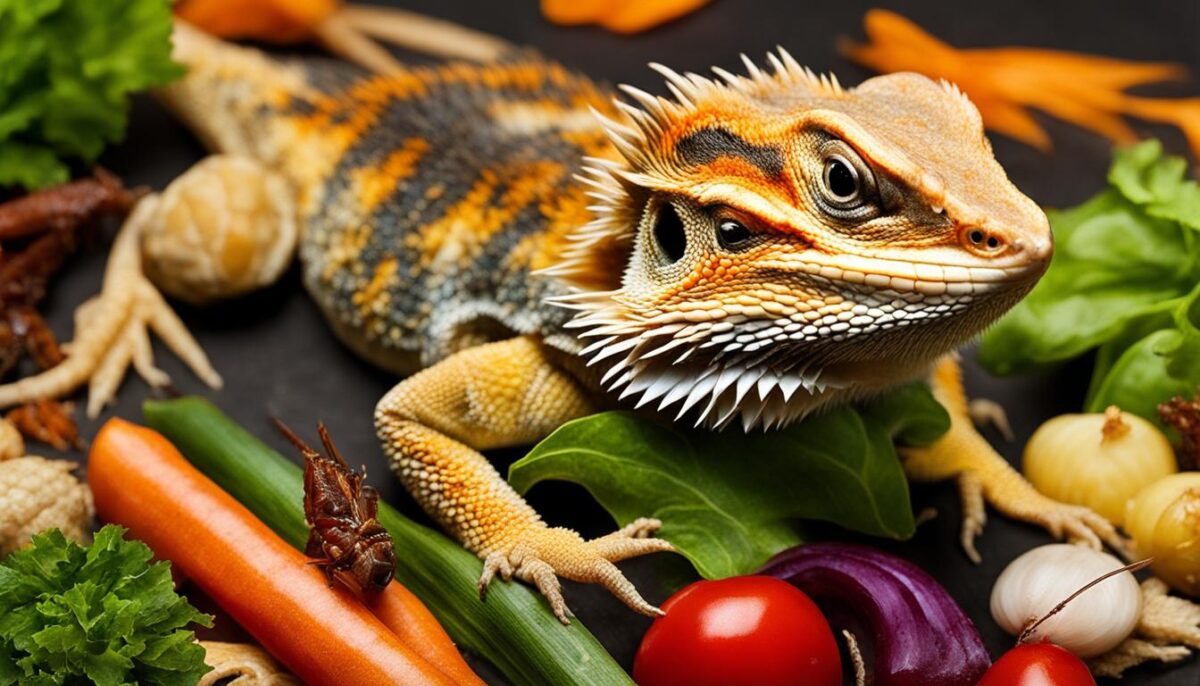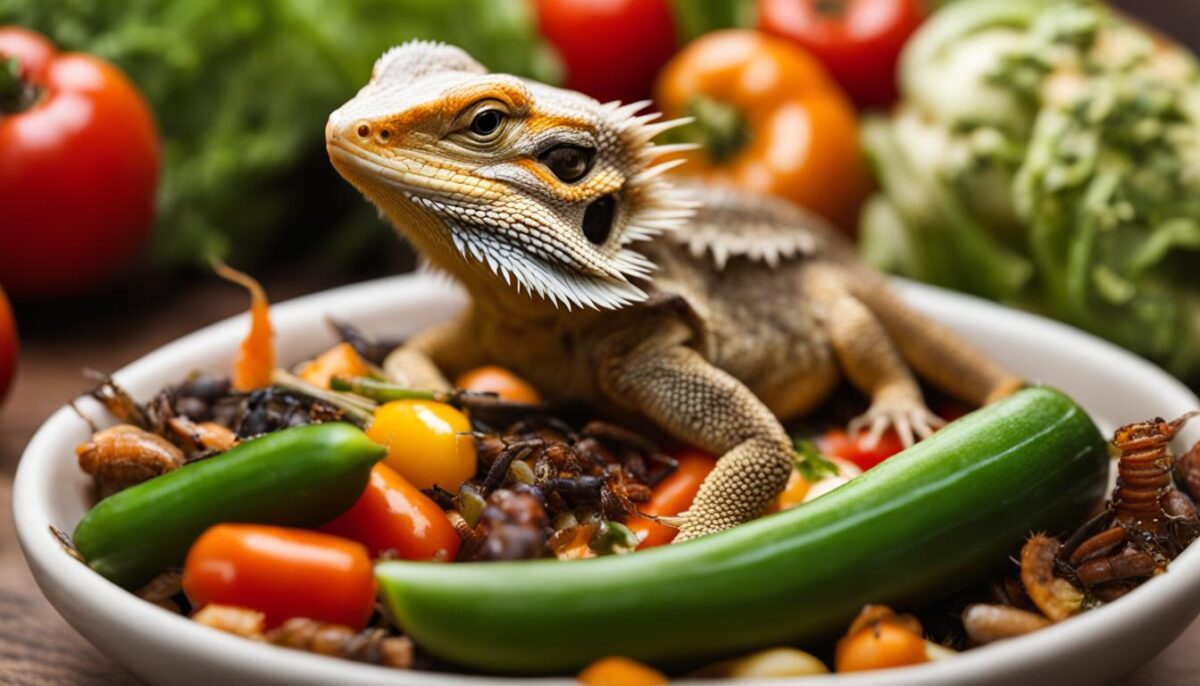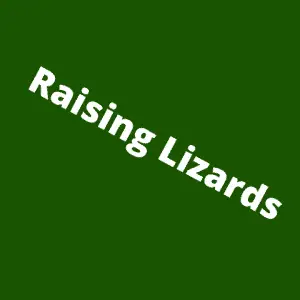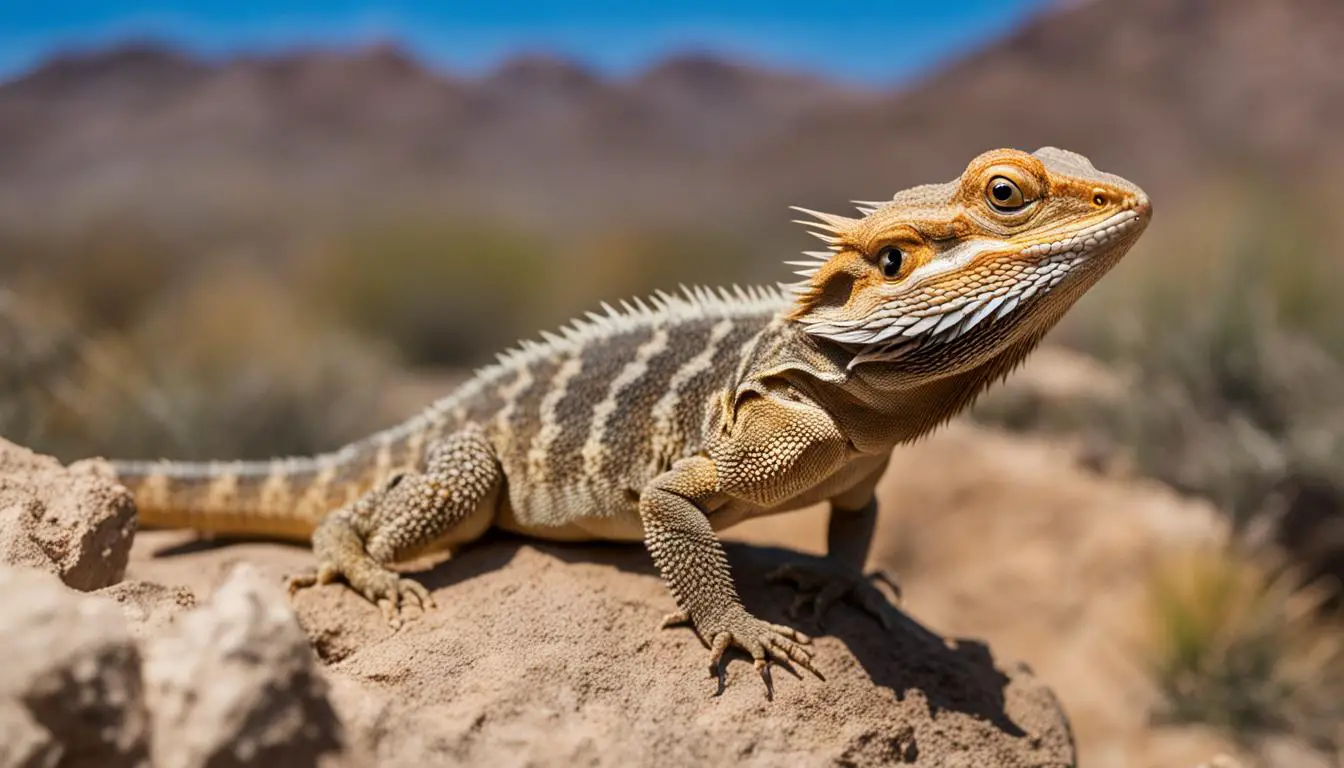Bearded dragons are a popular pet choice among reptile keepers, and one common question is whether they can eat dried mealworms. In this article, we will explore the potential benefits and risks of feeding dried mealworms to bearded dragons. We will also discuss the nutritional value of dried mealworms and the best diet for bearded dragons. By the end of this article, you will have a better understanding of whether dried mealworms are a suitable addition to your bearded dragon’s diet.
Key Takeaways:
- Dried mealworms can be a convenient option for feeding bearded dragons, but they should not be the sole source of food.
- Bearded dragons are omnivores and require a balanced diet that includes both plant-based and animal-based foods.
- While dried mealworms can provide protein, they are high in fat and low in calcium.
- It is important to offer dried mealworms in moderation and ensure they are of high quality and free from additives.
- Other protein sources, such as live insects, can be offered as alternatives to dried mealworms.
Can Bearded Dragons Eat Dried Mealworms
- Bearded dragons are omnivores and can eat a wide variety of worms, including hornworms, butterworms, waxworms, superworms, mealworms, silkworms, and grub worms.
- Grub worms, also known as beetle larvae, are a great source of protein and essential nutrients for bearded dragons.
- Grub worms are a great snack for bearded dragons, as their soft texture and small size make them easy to digest.
- Grub worms should be offered to bearded dragons as an occasional treat since they have high fat content.
- Grub worms should be fed to bearded dragons in moderation as they contain excess fats, which could lead to obesity if fed in excess.
- It is important to ensure that the worms are gut-loaded before feeding them to bearded dragons. This means that the worms should be fed a nutritious diet before being fed to the bearded dragon.
The Diet of a Bearded Dragon
Bearded dragons are omnivores, meaning they can eat both plant-based and animal-based foods. Their diet should consist of a variety of foods to ensure they receive all the necessary nutrients. Insects, such as crickets and mealworms, are an important part of a bearded dragon’s diet as they provide protein. However, it is important to provide a balanced diet that includes leafy greens, vegetables, and fruits to meet their nutritional needs.
Table:
| Category | Examples |
|---|---|
| Protein | Crickets, mealworms, dubia roaches |
| Leafy Greens | Collard greens, dandelion greens, mustard greens |
| Vegetables | Carrots, bell peppers, squash |
| Fruits | Blueberries, strawberries, papaya |
By providing a variety of foods, you can ensure that your bearded dragon receives all the essential nutrients they need for optimal health. It is also important to consider the size of the food items offered to avoid any choking hazards or digestive issues. Younger bearded dragons may require smaller prey items and softer vegetables, while adults can handle larger prey and a wider range of vegetables. Additionally, bearded dragons should always have access to clean water for hydration.can bearded dragons eat dried mealworms
While insects like crickets and mealworms are an important part of a bearded dragon’s diet, it is crucial to offer a balanced combination of plant-based foods as well. Leafy greens provide essential vitamins and minerals, while vegetables and fruits offer additional nutrients and variety. Remember that each bearded dragon is unique, so monitor their preferences and adjust their diet accordingly to ensure they are receiving the proper nutrition.
Can Bearded Dragons Eat Dried Mealworms?
Bearded dragons can eat dried mealworms in moderation. Dried mealworms can be a convenient option as they have a long shelf life and are easy to store. However, it is important to note that dried mealworms should not be the sole source of food for bearded dragons. They should be offered as an occasional treat and not as a regular part of their diet. It is also crucial to ensure that the dried mealworms are of high quality and free from any additives or preservatives. bearded dragon diet
While dried mealworms can provide additional nutrients and variety to a bearded dragon’s diet, they should be incorporated into a balanced diet that includes other protein sources, leafy greens, and vegetables. Bearded dragons are omnivores and require a diverse range of foods to meet their nutritional needs. Offering a variety of foods will help ensure that your bearded dragon receives all the necessary nutrients for optimal health. nutrition for bearded dragons
To provide a balanced diet for your bearded dragon, you can offer live insects such as crickets and dubia roaches as a natural source of protein. These insects can be more nutritionally balanced than dried mealworms and can provide a varied diet for your bearded dragon. It is important to consult with a veterinarian or reptile specialist to determine the best diet plan for your specific bearded dragon, taking into consideration their age, size, and overall health.
Benefits of a Balanced Diet for Bearded Dragons
Providing a balanced diet is essential for the overall health and well-being of bearded dragons. A diet that includes a variety of protein sources, leafy greens, and vegetables ensures that bearded dragons receive the necessary vitamins, minerals, and nutrients for growth and development. A balanced diet can also help prevent nutritional deficiencies and related health issues.can reptiles eat dried mealworms
| Nutrient | Role in Bearded Dragon’s Diet | Food Sources |
|---|---|---|
| Protein | Essential for muscle growth and repair | Live insects, such as crickets and dubia roaches |
| Calcium | Important for bone health and prevention of metabolic bone disease | Leafy greens, calcium supplements |
| Vitamins | Essential for various bodily functions | Leafy greens, vegetables, fruits |
| Fiber | Aids digestion and prevents constipation | Vegetables, fruits |
By maintaining a balanced diet and offering a variety of nutritious foods, you can ensure that your bearded dragon thrives and enjoys a healthy and fulfilling life.
Nutritional Value of Dried Mealworms
Dried mealworms can provide bearded dragons with a range of nutrients that are beneficial to their health. These crunchy snacks are a good source of protein, which is essential for muscle growth and repair. Protein also plays a vital role in maintaining a healthy immune system. Bearded dragons require a diet that includes sufficient protein to support their overall well-being.
Although dried mealworms are high in fat, which is not ideal for bearded dragons, they can still be included as a part of a balanced diet. It’s important to remember that moderation is key. Offer dried mealworms as an occasional treat rather than a staple food. By doing so, you can minimize the risk of weight gain and obesity, which can be detrimental to your bearded dragon’s health.benefits of dried mealworms for bearded dragons
It’s crucial to note that dried mealworms are low in calcium. Calcium is essential for maintaining strong bones and preventing conditions like metabolic bone disease. To ensure your bearded dragon receives enough calcium, it’s important to balance their diet by incorporating calcium-rich foods such as leafy greens and calcium supplements. This will help prevent any calcium deficiencies and promote healthy bone development.
| Nutrient | Amount per 100g of Dried Mealworms |
|---|---|
| Protein | 48g |
| Fat | 40g |
| Calcium | 30mg |
Although dried mealworms can provide nutritional benefits to bearded dragons, it’s essential to offer them in conjunction with a varied diet that includes other protein sources, leafy greens, and vegetables. This will help ensure your bearded dragon receives a well-rounded and balanced nutritional intake, promoting their overall health and well-being.
Potential Risks of Feeding Dried Mealworms
While dried mealworms can be a suitable addition to a bearded dragon’s diet, it is important to be aware of the potential risks associated with feeding them. Here are some key considerations:safe food for bearded dragons
1. Low Calcium Content
Dried mealworms are low in calcium, which is an essential nutrient for bearded dragons. Calcium deficiency can lead to serious health issues, such as metabolic bone disease. It is important to ensure that your bearded dragon’s diet includes sufficient calcium to prevent deficiencies. You can provide calcium supplements or include calcium-rich foods, such as leafy greens and calcium-dusted insects, to balance their diet.
2. High Fat Content
Dried mealworms are high in fat, which can contribute to weight gain and obesity in bearded dragons if consumed in excess. Obesity can lead to various health problems, including difficulty in movement and an increased risk of diseases. It is important to monitor your bearded dragon’s weight and adjust their diet accordingly to maintain a healthy body condition.
3. Quality and Contamination
When feeding dried mealworms to your bearded dragon, ensuring their quality is crucial. It is important to source dried mealworms from a reputable supplier to ensure they are free from any additives or preservatives that could be harmful to your reptile. Additionally, be cautious of purchasing dried mealworms that may have been stored improperly or contaminated with bacteria or parasites.
| Risk | Prevention |
|---|---|
| Low Calcium Content | Provide calcium supplements or calcium-rich foods |
| High Fat Content | Monitor weight and adjust diet accordingly |
| Quality and Contamination | Source from reputable suppliers and ensure proper storage |
By being mindful of these potential risks and taking appropriate precautions, you can safely incorporate dried mealworms into your bearded dragon’s diet without compromising their health and well-being. Remember to always consult with a veterinarian for specific dietary recommendations and to address any concerns you may have regarding your bearded dragon’s diet.
Feeding Guidelines for Bearded Dragons
When it comes to feeding dried mealworms to your bearded dragon, it’s important to follow some guidelines to ensure their health and well-being. While dried mealworms can be a convenient option, they should only be offered as a treat and not as a replacement for their main diet.dried mealworms as a snack for bearded dragons.
Bearded dragons require a balanced diet that includes a variety of foods. Along with dried mealworms, they should also be provided with a variety of protein sources, such as crickets and dubia roaches. Leafy greens, vegetables, and fruits should also be included to ensure they receive a good mix of nutrients.
It’s crucial to monitor your bearded dragon’s health and weight when incorporating dried mealworms into their diet. High fat content in dried mealworms can contribute to weight gain and obesity, so it’s important to adjust their overall diet according to their weight. Always provide clean water for your bearded dragon to ensure they stay hydrated.

Feeding Guidelines for Bearded Dragons:
- Offer dried mealworms as a treat, not as a main food source.
- Incorporate a variety of protein sources, including live insects like crickets and dubia roaches.
- Include a mix of leafy greens, vegetables, and fruits in their diet.
- Monitor their weight and adjust their diet accordingly to prevent weight gain and obesity.
- Always provide clean water for hydration.
By following these feeding guidelines, you can ensure that your bearded dragon receives a balanced diet and stays healthy. Remember to consult a veterinarian if you have any concerns about their diet or overall well-being.
Alternatives to Dried Mealworms
While dried mealworms can be a suitable addition to a bearded dragon’s diet, there are other protein sources that can be offered. Live insects, such as crickets and dubia roaches, are a popular choice for bearded dragons. These insects provide a natural source of protein and can be more nutritionally balanced than dried mealworms. It is important to offer a variety of protein sources to ensure a varied and balanced diet for your bearded dragon.
Live insects, such as crickets and dubia roaches, offer several advantages as alternatives to dried mealworms. They are more similar to the natural prey of bearded dragons, providing a more enriching feeding experience for your pet. Additionally, live insects are typically higher in moisture content than dried mealworms, helping to keep your bearded dragon hydrated. It is important to ensure that any live insects are appropriately sized for your bearded dragon, as they should be no larger than the space between their eyes.
There are other protein sources aside from insects that can be included in a bearded dragon’s diet. Dark leafy greens, such as kale, collard greens, and mustard greens, are excellent sources of calcium and other essential nutrients. Additionally, vegetables such as bell peppers, carrots, and squash can provide a variety of vitamins and minerals. Fruits, such as blueberries and melons, can also be offered as occasional treats. It is important to offer a balanced diet that includes a variety of protein sources, leafy greens, vegetables, and fruits to ensure that your bearded dragon receives all the necessary nutrients for optimal health.
Table: Comparison of Protein Sources for Bearded Dragons
| Protein Source | Nutritional Benefits | Feeding Frequency |
|---|---|---|
| Live Insects (Crickets) | High in protein and easily digestible | 2-3 times per week |
| Live Insects (Dubia Roaches) | High in protein and low in fat | 2-3 times per week |
| Dark Leafy Greens | Excellent source of calcium and other essential nutrients | Daily |
| Vegetables | Provide vitamins and minerals | Daily |
| Fruits | Occasional treat rich in antioxidants | Once a week |
By offering a variety of protein sources and ensuring a balanced diet, you can provide your bearded dragon with the best nutrition possible. It is important to consult with a veterinarian who specializes in reptile care for specific dietary recommendations based on your bearded dragon’s age, size, and health condition.
The Importance of a Balanced Diet
A balanced diet is crucial for the overall health and well-being of your bearded dragon. Providing a variety of foods that meet their nutritional needs is essential to support their growth and development. A balanced diet should include a combination of protein sources, leafy greens, vegetables, and fruits to ensure they receive all the necessary nutrients.
Protein sources, such as insects like crickets and dubia roaches, are an important part of a bearded dragon’s diet. These insects provide a natural source of protein and are nutritionally balanced. However, it is important to remember that protein alone is not enough. Leafy greens, vegetables, and fruits are also vital to provide vitamins, minerals, and fiber.
Calcium is another important nutrient that should be included in a bearded dragon’s diet. Calcium plays a key role in bone health and muscle function. It is recommended to provide calcium supplements, such as calcium powder, to ensure they receive adequate amounts. Additionally, it is important to provide access to clean water at all times.
Remember, a balanced diet is the key to a healthy and thriving bearded dragon. It is important to consult with a veterinarian or reptile specialist to ensure you are meeting your pet’s specific dietary needs. Providing a varied and balanced diet will help prevent any nutritional deficiencies and support their overall health and well-being.

The Importance of Calcium Supplementation
Calcium supplementation is crucial for bearded dragons as they require high levels of calcium for proper bone growth and health. A lack of calcium can lead to metabolic bone disease, a serious condition that can cause deformities and even death. It is important to provide a calcium supplement, such as calcium powder, to ensure your bearded dragon’s calcium needs are met.
When offering calcium powder, it is recommended to dust the insects or vegetables with a light coating before feeding them to your bearded dragon. This will ensure that they receive the necessary amount of calcium with each meal. It is important to follow the instructions and recommended dosage provided by the manufacturer to avoid over-supplementation.
In addition to calcium supplementation, it is also important to ensure your bearded dragon receives adequate amounts of natural sunlight or UVB lighting. UVB rays help the reptile’s body produce vitamin D3, which is essential for proper calcium absorption. Providing access to natural sunlight or using a UVB bulb helps prevent calcium deficiency and supports overall bone health.
Monitoring Your Bearded Dragon’s Diet
Regular monitoring of your bearded dragon’s diet and overall health is crucial to ensure they are receiving the proper nutrition. Keep track of their weight, activity level, and appetite to identify any changes or potential health concerns. If you notice any significant weight loss, decreased appetite, or other abnormal behavior, it is important to consult with a veterinarian.
A balanced diet is key to the longevity and well-being of your bearded dragon. By providing a variety of protein sources, leafy greens, vegetables, and fruits, along with calcium supplementation and proper lighting, you can help your pet thrive. Always prioritize their health and consult with professionals for tailored advice and guidance on their specific dietary needs.
Conclusion
In conclusion, dried mealworms can be included in a bearded dragon’s diet, but it is important to offer them in moderation as part of a balanced eating plan. While dried mealworms provide additional nutrients and variety, they should not be the sole source of food for these reptiles. It is crucial to ensure that the dried mealworms are of high quality, free from any additives or preservatives, and offered alongside a range of protein sources, leafy greens, and vegetables.
A balanced diet is essential for the overall health and well-being of a bearded dragon. In addition to dried mealworms, their diet should include other live insects like crickets and dubia roaches, which provide more nutritional balance. Leafy greens, vegetables, and fruits should also be incorporated to meet their nutritional needs. Calcium and vitamin supplements may be necessary to prevent any deficiencies.
By following these guidelines and offering a varied diet, you can ensure that your bearded dragon gets the necessary nutrients it needs to thrive. Remember to monitor their weight and consult a veterinarian if you have any concerns about their diet or health. With proper care and nutrition, your bearded dragon can lead a healthy and happy life.
FAQ
Can bearded dragons eat dried mealworms as their main source of food?
No, dried mealworms should not be the sole source of food for bearded dragons. They should be offered as an occasional treat and not as a replacement for their main diet.
Are dried mealworms a good source of protein for bearded dragons?
Yes, dried mealworms are a good source of protein for bearded dragons. They contain essential amino acids that are important for muscle growth and repair.
Are dried mealworms high in fat?
Yes, dried mealworms are high in fat. It is important to offer them in moderation and as part of a balanced diet that includes other protein sources, leafy greens, and vegetables.
Can bearded dragons develop calcium deficiency from eating dried mealworms?
Yes, dried mealworms are low in calcium. It is important to ensure that bearded dragons receive proper calcium supplementation to prevent calcium deficiency.
Where can I buy high-quality dried mealworms for my bearded dragon?
It is important to source dried mealworms from a reputable supplier to ensure they are of high quality and free from any additives or preservatives. You can find them at pet stores or online reptile supply websites.
How often should I offer dried mealworms to my bearded dragon?
Dried mealworms should be offered as a treat and not as a regular part of their diet. It is recommended to offer them a few times a week, alongside a variety of other foods.
Can I feed live insects instead of dried mealworms to my bearded dragon?
Yes, live insects such as crickets and dubia roaches are a popular choice for bearded dragons. They provide a natural source of protein and can be more balanced nutritionally compared to dried mealworms.
What should be included in a bearded dragon’s diet besides dried mealworms?
A bearded dragon’s diet should consist of a variety of protein sources, including insects and other appropriate live prey. Additionally, leafy greens, vegetables, and fruits should be included to ensure a balanced and nutritious diet.
How can I ensure my bearded dragon receives all the necessary nutrients?
It is important to offer a varied diet that includes a mix of protein sources, leafy greens, vegetables, and fruits. Additionally, calcium and vitamin supplements may be necessary to ensure they receive all the necessary nutrients. Consulting with a veterinarian can help determine the specific needs of your bearded dragon.


